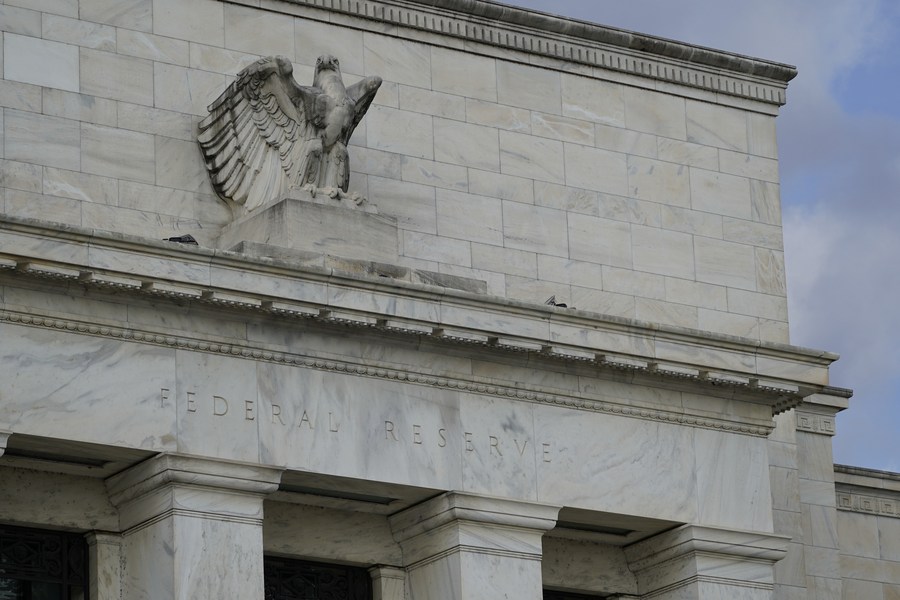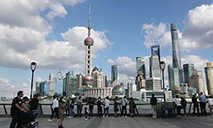Hawkish U.S. Fed sparks market sell-off, adds to global growth worries
-- The Fed signaled on Wednesday that the central bank is ready to raise interest rates as soon as March to combat surging inflation as it exits from the ultra-loose monetary policy enacted at the start of the COVID-19 pandemic.
-- Investors and economists are concerned that an aggressive rate hiking cycle by the Fed could spark market turmoil and cause adverse spillovers to emerging markets and developing economies.
-- The IMF also noted that a less accommodative monetary policy in the United States is expected to prompt tighter global financial conditions and make borrowing more expensive worldwide, which could strain public finances and weigh on the recovery.
WASHINGTON, Jan. 27 (Xinhua) -- The U.S. Federal Reserve on Wednesday signaled that the central bank could become more hawkish than previously expected as it tries to contain a historic surge in inflation.
However, investors and economists are concerned that an aggressive rate hiking cycle by the Fed could spark market turmoil and cause adverse spillovers to emerging markets and developing economies. It would also add to mounting worries about a slowing global economy already grappling with supply disruptions, higher inflation and record debt.
HAWKISH FED SPARKS MARKET SELL-OFF
The Fed signaled on Wednesday that the central bank is ready to raise interest rates as soon as March to combat surging inflation as it exits from the ultra-loose monetary policy enacted at the start of the COVID-19 pandemic.
"The economy no longer needs sustained high levels of monetary policy support," Fed Chair Jerome Powell said at a virtual press conference following a Fed policy meeting.

Photo taken on Jan. 25, 2022 shows the U.S. Federal Reserve in Washington, D.C., the United States. (Photo by Ting Shen/Xinhua)
"That is why we are phasing out our asset purchases and why we expect it will soon be appropriate to raise the target range for the federal funds rate," he said.
Noting that inflation risks are "still to the upside" in the views of most Fed officials, Powell said he believed "there is quite a bit of room to raise interest rates without threatening the labor market."
Powell did not rule out the idea of raising rates at every policy meeting this year, which would amount to seven increases in 2022. However, Fed officials' median interest rate projections released last December forecast just three rate hikes this year.
Powell's hawkish stance sparked a sharp stock market sell-off. The S&P 500 gave up a 2 percent gain to close 0.15 percent lower. Nine of the 11 primary S&P 500 sectors ended in the red, with real estate and materials down 1.66 percent and 1.06 percent, respectively, leading the laggards.
Gita Gopinath, first deputy managing director of the International Monetary Fund (IMF), has warned of "market corrections" as U.S. interest rates move up.
"One would expect that as interest rates go up, we would see corrections in markets. The hope is that this will stay orderly," Gopinath said Tuesday at a press briefing, calling for "well telegraphed communication" from the Fed about its monetary policy path.
"We should expect interest rates to go up. There is a tremendous amount of uncertainty, about how much would it go up by and how many rate hikes it would take," she said.
The Fed has pledged to keep its federal funds rate unchanged at the record-low level of near zero since the onset of the pandemic, while U.S. inflation has become higher and more persistent in recent months.
The consumer price index rose 7 percent in December 2021 from a year earlier, the largest 12-month increase since June 1982, according to the U.S. Labor Department.

A customer shops at a store in New York, the United States, Jan. 12, 2022. (Xinhua/Wang Ying)
DEBT BURDENS, GLOBAL GROWTH CONCERNS
In an update to its World Economic Outlook report on Tuesday, the IMF projected the global economy to grow by 4.4 percent in 2022, down 0.5 percentage point from the forecast in October 2021, as economies grapple with supply disruptions, higher inflation, record debt and persistent uncertainty.
The IMF also noted that a less accommodative monetary policy in the United States is expected to prompt tighter global financial conditions and make borrowing more expensive worldwide, which could strain public finances and weigh on the recovery.

File photo taken on April 6, 2021 shows an exterior view of the International Monetary Fund (IMF) headquarters in Washington, D.C., the United States. (Photo by Ting Shen/Xinhua)
"Many countries have higher public and private debt. Debt service burdens could therefore rise significantly with higher interest rates," the IMF said, adding that high post-pandemic debt burdens will be an ongoing challenge for years to come.
Global debt rose to a record 226 trillion U.S. dollars in 2020 as the world was hit by the pandemic and a deep recession, according to the multilateral lender.
Meanwhile, faster Fed rate increases could rattle financial markets, leading to capital outflows and currency depreciation in emerging markets and developing countries, economists said.
"Foreign investment in emerging market stocks and bonds outside China has come to an abrupt standstill over fears that many economies will not recover quickly enough from the pandemic this year," Jonathan Fortun, an economist at the Institute of International Finance, said in a note earlier this month.
"We believe that the outlook is worsened by the Omicron variant and expectations of a stronger dollar and higher U.S. interest rates," Fortun said.
Petya Koeva Brooks, deputy director of the IMF's Research Department, told Xinhua that clear policy communication by the Fed will be particularly important to "minimize the risks of adverse spillovers."
"When you know what is coming, it is much easier to be ready for it and to prepare for it," Brooks said. "We are in an unprecedented situation. So it is good to be ready."

Photo taken on Jan. 25, 2022 shows the U.S. Federal Reserve in Washington, D.C., the United States. (Photo by Ting Shen/Xinhua)
The World Bank suggested that emerging markets and developing countries need to continue rebuilding their foreign exchange reserves, bolster foreign currency risk monitoring, and strengthen macroprudential policies, in light of reduced portfolio inflows in 2021 and the tightening of domestic financing conditions.
In addition, international cooperation will also be essential to minimize stress during the forthcoming tightening cycle.
"Ready access to reserve currency liquidity is an important buffer against the international amplification of these risks. IMF lending arrangements can be an important backstop to smooth the impact of the shocks," the IMF said.
Photos
Related Stories
- US aims for better at Beijing Olympic Winter Games
- Chinese Consulate General in New York unveils online opera program for Lunar New Year
- U.S. Fed says it will soon be appropriate to raise interest rates amid surging inflation
- No intention of putting US or NATO troops in Ukraine: Biden
- U.S. to send 222 athletes to Beijing Winter Olympics
Copyright © 2022 People's Daily Online. All Rights Reserved.










